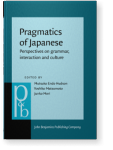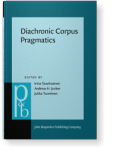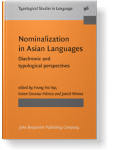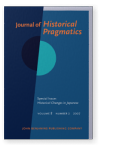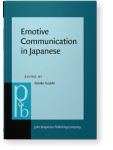Rumiko Shinzato
List of John Benjamins publications for which Rumiko Shinzato plays a role.
2018 Chapter 2. Amari/anmari/anma and totemo/tottemo in history and discourse: Interaction of negative polarity and positive polarity Pragmatics of Japanese: Perspectives on grammar, interaction and culture, Hudson, Mutsuko Endo, Yoshiko Matsumoto and Junko Mori (eds.), pp. 49–74 | Chapter
This chapter first presents the distributional patterns of totemo and amari as positive polarity items (PPIs) and negative polarity items (NPIs) in a present-day spoken corpus, by paying due attention to their morphophonological variants, tottemo and anmari/anma. It also analyzes ‘prefabs’ (Bybee… read more
2017 Chapter 11. Grammaticalization of PMs/DMs/MMs in Japanese Pragmatic Markers, Discourse Markers and Modal Particles: New perspectives, Fedriani, Chiara and Andrea Sansó (eds.), pp. 305–333 | Chapter
This paper discusses the source lexemes and the grammaticalization pathways leading to such end products as Discourse Markers (DMs), Modal Markers (MMs), and Pragmatic Markers (PMs) in relation to the layered structures of Japanese syntax, as well as issues of left/right peripheries (LP/RP). It… read more
2014 From degree/manner adverbs to pragmatic particles in Japanese: A corpus-based approach to the parallel diachronic development of amari, bakari, and yahari Diachronic Corpus Pragmatics, Taavitsainen, Irma, Andreas H. Jucker and Jukka Tuominen (eds.), pp. 77–106 | Article
This is a corpus-based analysis of synchronic and diachronic variations of the Japanese degree adverbs amari ‘extremely’ and bakari ‘about, to the extent’, and the manner adverb yahari ‘being still’. These variations are unique in that they are not constructions, but morphophonological variants.… read more
2014 Subjectivity, intersubjectivity and Japanese grammar: A functional approach Usage-based Approaches to Japanese Grammar: Towards the understanding of human language, Kabata, Kaori and Tsuyoshi Ono (eds.), pp. 85–108 | Article
This survey study intends to show the benefits of adopting the functional linguistic perspectives of emphasizing the non-referential and emotive/subjective aspects of language, which are largely neglected in mainstream formalist linguistics. Specifically, this paper will first point out the fact… read more
2011 Nominalization in Okinawan: From a diachronic and comparative perspective Nominalization in Asian Languages: Diachronic and typological perspectives, Yap, Foong Ha, Karen Grunow-Hårsta and Janick Wrona (eds.), pp. 445–472 | Article
This paper demonstrates that the four functions originally tied to rentaikei in Old Japanese (OJ), and its sister-language, Old Okinawan (OOk) have been carried on into Modern Okinawan (MOk). In particular, the new rentaikei maintains adnominal, exclamative and cleft functions (kakari musubi),… read more
2007 (Inter)subjectification, Japanese syntax and syntactic scope increase Historical Changes in Japanese: Subjectivity and intersubjectivity, Onodera, Noriko O. and Ryoko Suzuki (eds.), pp. 171–206 | Article
This paper investigates the correlation between semantic-pragmatic change of (inter)subjectification and its syntactic effects. It points out that the diachronic change of subjectification > intersubjectification (Traugott 2003) finds its synchronic counterpart in the rigid predicate order of… read more
2006 Subjectivity, Intersubjectivity, and Grammaticalization Emotive Communication in Japanese, Suzuki, Satoko (ed.), pp. 15–33 | Article
